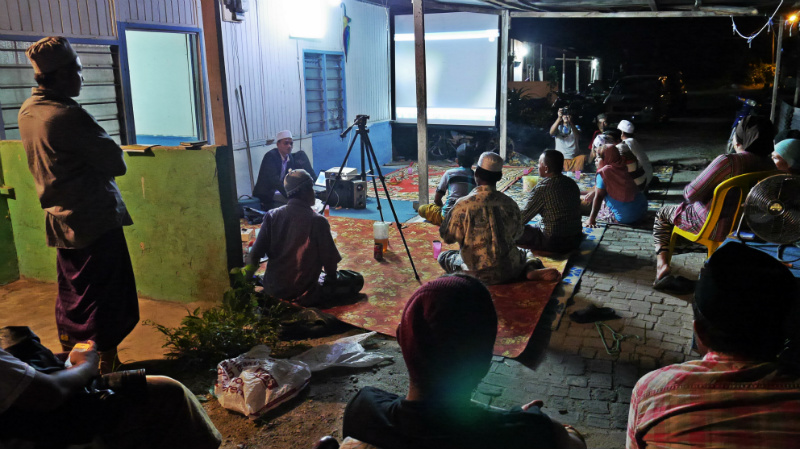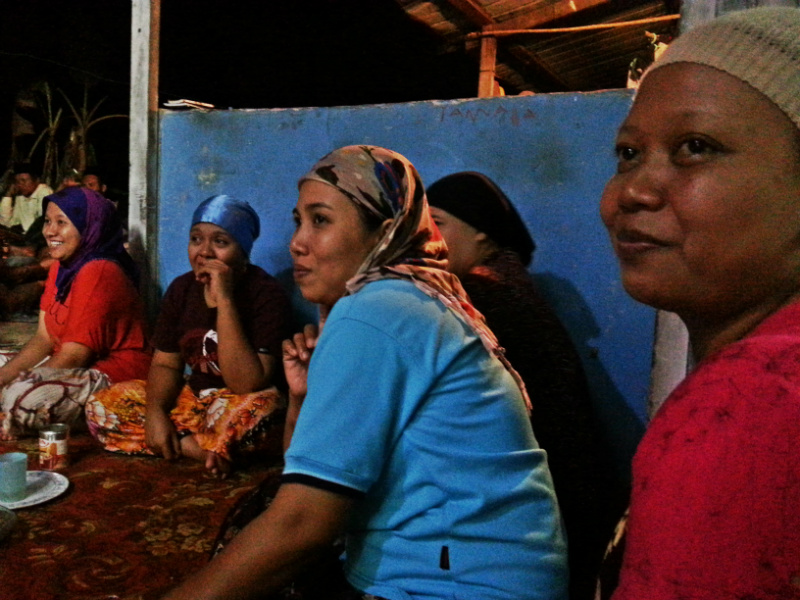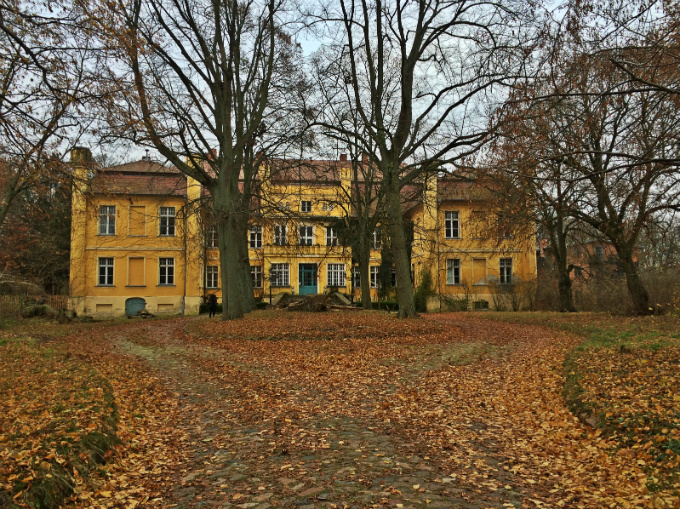EngageMedia Blog
Papuan Voices II Filmmakers: Agus Kalalu
Name: Agustinus Kalalu
Age: 31
Location: West Papua
Agustinus Kalalu or Agus is a talented videographer who is currently actively involved in Papuan Voices in Sorong, Papua Barat. Together with his colleagues, he is also working closely with the indigenous communities' struggle to stop the destruction brought by palm oil companies in Papua Barat.

1. Please tell us about the situation in the area that you work in.
The situation is getting worse for the indigenous people in Papua Barat. I'm currently working with the Moi people from around the city and district of Sorong, especially some of the big families that live on indigenous land that has been occupied by palm oil companies.
The biggest of these companies is PT Henrison Inti Persada (HIP). They have been occupying really vast areas of Moi land. That is destroying the living spaces of indigenous people, which have been guarded by their ancestors for many generations.
2. Why did Papuan Voices II come about and what are its activities now?
Papuan Voices II was created based on the idea that it would become a creative space for young Papuans. For now, we are still planning on what to do next after this round video production.
3. What do you think about the use of video to create social change?
With video, we can show the public many human rights and socio-economic violations. We can push for change from the central and regional government, and also from parties that have shares and bonds in PT Henrison Inti Persada, for example.
As far as the central and regional governments go, we demand that they issue more laws to protect indigenous people and our natural resources.
4. What's your plan after this in relation to Papuan Voices and the community around it? And what will you do with all of the videos in this collection?
We will conduct our own screenings, and all of our videos will be screened at the National Gathering of Indigenous People in March 2015 in Sorong. There is also a plan also to show the videos at the UNIPA campus in Manokwari.
We know as well that there will be screenings held in Jakarta and Yogyakarta, and possibly in Australia and the Netherlands.
5. When non-Papuans see your film, what kind of reaction do you hope to get from them and what actions do you hope people take?
We hope that people can help us push the Indonesian government at central and local levels to give better protection to the indigenous people of Papua. We need to work to create partnerships with the national and international media to widen our distribution networks and strengthen our capacity, especially in areas of video production.
Papuan Voices II: Suku Karon dan Persoalan Kesehatan di Papua

Disebutkan 15% dari dana Otsus yang sangat besat yang dikucurkan oleh pemerintah dialokasikan untuk kesehatan, namun hingga saat ini kondisi pelayanan kesehatan untuk penduduk Papua masih dirasa sangat kurang. Jumlah puskesmas yang masih sangat minim, jumlah tanaga medis yang juga sangat sedikit, tak tersedianya obat-obatan yang dibutuhkan menimbulkan berbagai problem kesehatan seperti tingkat kematian ibu dan anak yang sangat tinggi, prevalansi HIV/AIDS yang juga sangat tinggi, serta seringnya terjadi wabah penyakit yang menimbulkan kematian.
Salah satu film dalam kompilasi Papuan Voices II menceritakan tentang Hans Mambrasar yang melayani masyarakat suku Karon di delapan desa di Kabupaten Tambrauw, Papua Barat. Saat desa Jokbijoker dilanda wabah penyakit yang membunuh puluhan warga di beberapa desa, Hans menempuh perjalanan kaki selama berhari-hari untuk membawa warga yang sakit ke desa yang memiliki klinik kesehatan.
Hans Mambrasar telah beberapa kali meminta pemerintah untuk membangun pusat layanan kesehatan dan menyediakan tenaga medis namun hingga film ini selesai diproduksi, harapan itu belum terlaksana.
Film pendek yang menceritakan tentang persoalan kesehatan di satu kabupaten di Papua Barat ini akan menjadi salah satu film yang akan diluncurkan pada akhir Januari 2015 di Yogyakarta dan diputar di beberapa kota lainnya.
Crossroads Community Screenings Kick Off in Malaysia

Following the recent screenings that have been organised for Crossroads, our advocacy video project on migrants, this January saw the first community screening amongst Indonesian migrant workers living in a village in Sungei Pinang, Klang, Malaysia.
The event, which was attended by an audience of 25 migrant workers, was facilitated by Muhammad Mundir, one of the Crossroads filmmakers and a migrant from Indonesia himself with assistance from our local partners, KOMAS.
The community in Sungei Pinang consists of mostly migrant workers from Madura, Indonesia. Only a week ago, they witnessed a worrying incident, where some of them had been cheated by their employer. Mundir had requested the Malaysian NGO Tenaganita to advise and intervene, and so our screening was also a follow-up to that.

During the first of two rounds of discussions, the attendees shared their own experiences of facing problems related to not having a valid work permit due to being cheated by various agencies. Mundir assured them that they are victims and have legitimate rights as workers and human beings even if they were undocumented.
 After the second set of films which featured 'Polis Pao', Mundir spoke about how to legally get a motorbike license, as many migrants are caught by the police for riding illegally. The importance of knowing the law and their rights was emphasized and it was added that future workshops can be organised on these topics if people were keen to know more.
After the second set of films which featured 'Polis Pao', Mundir spoke about how to legally get a motorbike license, as many migrants are caught by the police for riding illegally. The importance of knowing the law and their rights was emphasized and it was added that future workshops can be organised on these topics if people were keen to know more.
Once again, the film that that had most emotional impact was 'Sekolah Harapan Bangsa', which tells the story of a school run for the children of Indonesian migrants in Sabah, East Malaysia. It was related to us that most of the migrants at the screening sent back or left their children in Indonesia.
In our view, the first Crossroads community screening was successful in bringing together migrants who face similar issues and are only now beginning to realise their rights and that there are groups that can support them during their time in Malaysia.
Papuan Voices II: The Inspirational Dr. Mia

One video from Papuan Voices II which everybody's been talking about is Mutiara Dalam Noken (Pearl in the Noken), which tells the story of Dr. Mia, a Papuan woman who was fortunate enough to get a higher education and become a doctor. She has devoted her life to treat the ill and disenfranchised in very remote areas in West Papua, and she does that to carry on the legacy of her parents who did the same when they themselves were young health officers.

After watching 'Pearl in the Noken' at a screening that was held on 12 and 13 December 2014, many Papuan students discussed this video with admiration of Dr. Mia's efforts and strength. They felt inspired to apply her noble qualities into their own lives, especially on the notion of going back and contributing to Papua.
'Pearl in the Noken' is just one out of eight amazing stories from Papuan Voices II that we can't wait to share with the world. So stay tuned to our website and follow us on Facebook and Twitter for more updates in the lead up to the official launch!
Papuan Voices II: Mama Mariode

Kalimat diatas diucapkan oleh Mariode Malak kepada anak-anaknya. Salah satu persoalan besar di Papua saat ini adalah menghilangnya tanah-tanah adat yang dirampas oleh perusahaan-perusahaan besar dan diubah menjadi kebun-kebun kelapa sawit yang tidak memberikan manfaat bagi penduduk asli.
Lebih jauh, persoalan ini menyebabkan masalah-masalah mendasar yang terkait dengan ketahan pangan penduduk setempat, hilangnya mata pencaharian dan tersingkirnya mereka dari proses pembangungan yang menghargai martabat mereka sebagai pemilik tanah-tanah adat tersebut.
Di tengah hiruk pikuk percepatan eksploitasi sumber daya alam atas nama pembangunan, Mariode Malak berjuang melawan proyek-proyek raksasa ini dengan tujuan untuk mempertahankan lahan-lahan hutan yang tersisa dengan pikiran yang sangat sederhana, yakni keberlangsungan hidup anak-anak dan cucunya.
Kisah Mariode Malak ini terangkum dalam sebuah film pendek berdurasi 4:51 berjudul “Mama Mariode.” Film pendek ini akan menjadi salah satu dari delapan film pendek dalam kompilasi Papuan Voices Vol. II yang akan diluncurkan untuk publik pada tanggal 30 Januari 2015 di Yogyakarta.
RightsCon Update: Program Highlights

We are very excited to be partnering with Access and local hosts Foundation for Media Alternatives to organise the RightsCon summit in Manila this year. The RightsCon agendas are built by the community, and our all-star programming committee members are currently reviewing the 250+ proposals we've received from over 40 nations.
To give you a preview of what's in store here's a slice of the sessions you can expect to see in Manila this year:
- Breaking Silos, Building Collaboration: A Cross-Sectoral Discussion of the Future of Human Rights and Technology
- Not Too Inaccessible for Broadband: Connecting Remote Communities With Wireless Spectrum
- Asia Chats: Security and Privacy of Asian Messaging Apps
- Religious Fundamentalism Online and Human Rights: Perspectives and Solutions
- Prosecutor vs Perpetrator X: A Mock Debate on the Potential for Using Technology for Truth
View more from the list here.
The RightsCon Southeast Asia Conference runs from March 24-25, but is bracketed by satellite events beginning 21 March.
Please visit the RightsCon website to participate in the event, and find out latest information including new speakers and program announcement.
We look forward to seeing you in Manila!
Internet access and censorship are the biggest challenges in Southeast Asia: Mong Palatino, Global Voices
1. Could you describe the work of your organisation?
Global Voices is a citizen media platform that highlights the perspectives and stories of ordinary people, especially those that are not often reported in mainstream media. Our volunteers translate, curate, and explain local narratives as we seek a better understanding of our world. We champion freedom of expression by highlighting the threats to online freedom as well as campaigning to defend free, open, and safe Internet.
2. Why do human rights on the Internet matter to you?
The Internet can empower lives and communities. That is why it must remain open and accessible. Individuals should be free to share their thoughts, develop online tools, and interact with other Internet users. A human rights framework should guide Internet governance to protect individuals and to unleash the democratic potential of the cyberspace.
3. What is the biggest challenge you face in your work?
There are two challenges in the region: improving Internet access, and fighting all forms of censorship and excessive Internet regulation. Related to these issues, we strive to protect the safety of individuals and institutions which are in the forefront of the campaign to promote Internet rights in their respective countries.
4. How do you interact with individuals and organisations in different sectors, civil society, corporate, tech, govt etc., to forward your goals?
As a former legislator, I am aware of the value of reaching out to policymakers and engaging them on issues that affect the Internet and the media. They should be part of the dialogue on how to protect the Internet and we strive as much as possible to promote this approach.
5. How do you see the Internet rights space evolving in the future?
Unfortunately, the trend in Southeast Asia is quite worrying since governments are inclined to prioritize legislations that would further restrict the media and the Internet. But the business side of expanding the telecommunications sector continues to grow. I think activists, the media sector, the academe, and other stakeholders should team up with telcos and IT firms to influence the Internet policies in the region. They can build a formidable lobby team to discuss human rights and prospects in the Internet sector with government officials and other leaders in the bureaucracy.
6. What do you hope to see achieved at RightsCon Southeast Asia? And why would you encourage people to attend?
RightsCon Southeast Asia is significant because it can come up with concrete proposals, alternative policies, and innovative programs that can be submitted to the ASEAN. The papers can be tabled for discussion in the ASEAN secretariat as the region prepares for the ASEAN 2015 integration. RightsCon is unique opportunity for Southeast Asia experts, leaders, investors and activists to sit down and discuss the crucial issues in the IT sector. It’s also a timely occasion to draft a plan on how to improve, maximize, and protect the positive legacy and potential of the Internet.
My Week at the Gender and Technology Pop-up Institute

The first-of-its-kind Institute was run from 1–7 December 2014 in a small village 1.5 hours away from the city of Berlin at Wartin Schloss, an old castle owned by three professors. When events began on the morning of the 1st of December, I found out that there was around 80 people in the room, 60 participants and 20 facilitators. In my view, that was a great composition, because it allowed us participants to get the attention and assistance that we needed.
The first two days were filled with larger group discussions on topics around technology and gender, digital security, and privacy. On the third day, participants were divided into 2 groups of our own choice to follow workshop tracts on Training Skills or Privacy Advocacy. I chose to join the Privacy Advocacy group where we spoke on a variety of sub-topics including the recent development of digital privacy threats, online violence, and how to carry out privacy advocacy work. By the end of the fifth day, the group had come up with some concrete action plans.

Every day, there were also skill shares by both participants and facilitators, which ranged from how to manage wikis and digital libraries, to conducting online research, and using digital story telling, video advocacy, and digital security skills (that were not covered in the hands-on digital security training sessions). The aforementioned hands-on digital security trainings happened every afternoon, which were split into two groups of intermediate and advanced skills in PGP, VPN, TOR, secure chat, email and mailing lists, and more.
The training sessions ended at 6PM each day but that didn’t mean that the activities stopped there. The hours after dinners were full of activities such as film screenings, discussions, stencil workshops, yoga, capoeira, gingerbread baking competitions, and of course hackerspaces that were open every night for everyone to learn from each other with regards to digital security and beyond, as well as for holding small meetings. In fact, we ended almost every day at around 11PM!
All in all, it was a great life-experience for me. Meeting feminists from all over the world, learning new skills, gaining new knowledge and insights, and knowing that I had support for doing what I have been doing from contemporaries from around the world, all with their own respective stories to share.

Crossroads Screening and Women Migrant Workers Discussion with OBR Indonesia

It was an afternoon of heavy rain in Jakarta, but it didn’t hamper the spirits of EngageMedia and OBR Indonesia in hosting the film screening for International Migrants Day at Coffeewar, Kemang, South Jakarta. As we kicked off the event, around 30 people were cozying up at the café to watch the films.
Two of the films being shown were 'Perangkap' and 'Perjuangan Seorang Ibu' from Crossroads, our collection of advocacy videos for and by migrant workers, along with 'Jalan Pulang' by Yayasan Jurnal Perempuan.
The post-screening discussion included resource persons Dinda Nuuranisaa Yura from Solidaritas Perempuan, an organization focusing on women migrant workers issues, and Zely Ariane from Perempuan Mahardika, an organization that organizes women factory workers. They both spoke on the situation of women migrant workers and the similarity of the issues faced by women factory workers.

We were very thankful that there were some former migrant workers who came to the event and shared their heartfelt experiences of working abroad as well as their inspiring stories of fighting for their rights. Also discussed was how women from different sectors of society should unite to fight for the rights of all women, from which we came up with a set of concrete strategies that we could all work together on.
This event served as the first Indonesian screening for the outreach we are doing for Crossroads this year, and we hit the road in February to visit a number of cities for more screenings - So stay tuned!

 Subscribe to blog feed
Subscribe to blog feed